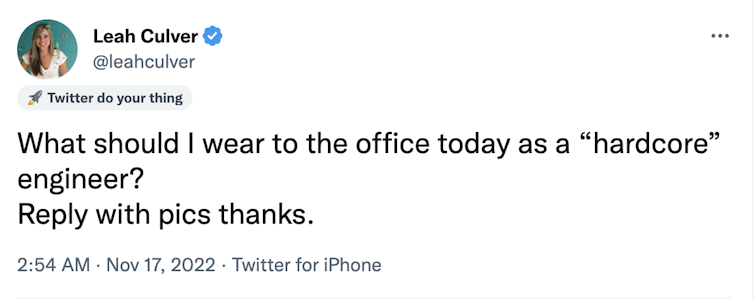As a case research in easy methods to implement organisational change, Elon Musk’s actions at Twitter will go down because the gold commonplace in what to not do.
Amongst different issues, the proof exhibits profitable organisational change requires: a transparent, compelling imaginative and prescient that’s communicated successfully; worker participation; and equity in the way in which change is applied. Belief in leaders is additionally essential.
Musk, the world’s richest man, seems in a rush to make Twitter right into a money-spinner. Nevertheless it takes time to grasp the necessities for profitable organisational change. Two in three such efforts fail, leading to vital prices, a burdened workforce and lack of key expertise.
Change administration by no means fairly goes to plan. It’s exhausting to determine whether or not Musk even has a plan in any respect.
Musk’s ‘extraordinarily hardcore’ fashion
Since taking on Twitter on October 27, Musk has stopped workers working from dwelling, cancelled worker lunches, and laid off about 3,700 workers – roughly half of Twitter’s workforce. Many realised that they had been sacked once they may now not entry their laptops.
Simply days later it emerged that Musk had a group of snoopers comb by way of workers’ non-public messages on Slack, firing these who had criticised him.
Then, on Wednesday final week, Musk despatched an ultimatum to employees to pledge dedication to a brand new “extraordinarily hardcore” Twitter that “will imply working lengthy hours at a excessive depth”. Staff had till 5pm the following day to simply accept, or take a severance bundle.
About 500 employees reportedly wrote farewell messages.

Musk seems to not have anticipated this response. Because the “hardcore” deadline approached, he began bringing key employees into conferences, attempting to persuade them to remain.
He additionally walked again his working-from-home ban, emailing employees that “all that’s required for approval is that your supervisor takes accountability for guaranteeing that you’re making a superb contribution”.
It was unsuccessful. So many workers determined to depart that on Friday Twitter locked all employees out of its workplace till Monday amid confusion as to who really nonetheless labored there and will have entry.
Layoffs and restructuring are widespread in organisational change. However the way in which they’re managed has vital results on those that are leaving, in addition to those that stay. If you need workers to be dedicated and to reply to a disaster, telling them they’re lazy and threatening them gained’t assist.
Selection issues
However what about SpaceX and Tesla – the businesses on which Musk has constructed his fame and fortune? Doesn’t their success show he is an effective chief?
Not so quick. There’s a huge distinction between a mission-driven firm like SpaceX and a platform like Twitter.
When there’s a widespread mission to attain one thing extraordinary or which hasn’t been completed earlier than, workers will typically willingly work extraordinarily lengthy hours in troublesome conditions.
They may select to go above and past and work lengthy hours in the event that they really feel aligned with the organisation’s goal or that their work issues. However the important thing level right here is that they select.
As one Twitter worker tweeted after Musk’s “hardcore” e mail:
I didn’t need to work for somebody who threatened us over e mail a number of occasions about solely ‘distinctive tweeps ought to work right here’ after I was already working 60-70 hours weekly.
Musk ignores the basics
Each Tesla and SpaceX have many sad workers, with lawsuits filed over working circumstances and Musk’s administration fashion.
He has been counseled for his considering on iterative design and fixing engineering issues. Difficult previous fashions which will now not be helpful is essential. However the fundamentals of management and organisational change are nonetheless important – and on these, Musk falls woefully brief.
Whereas his workers – actual individuals who aren’t billionaires and who’ve lease or mortgages to pay – had been grappling with what being “hardcore” even means, and the way which may affect their means to have a life exterior work, Musk was tweeting about his ballot on whether or not former US president Donald Trump ought to be allowed again on the platform.
Then, after Trump declined to return, Musk tweeted the next:

The concept of another chief govt sending such a message on social media nearly defies perception.
Some have advised this entire debacle is an ego journey for Musk – a idea lent credence by his try and get out of the deal. His actions pose a major threat to the enterprise even when there are nonetheless sufficient workers round to maintain it working.
Twitter’s former head of belief and security, Yoel Roth, who resigned on November 10, wrote final week:
Nearly instantly upon the acquisition’s shut, a wave of racist and antisemitic trolling emerged on Twitter. Cautious entrepreneurs, together with these at Common Mills, Audi and Pfizer, slowed down or paused advert spending on the platform, kicking off a disaster inside the firm to guard treasured advert income.
However much more highly effective than the advertisers, Roth famous, are the digital storefronts of Apple and Google:
Failure to stick to Apple’s and Google’s tips can be catastrophic, risking Twitter’s expulsion from their app shops and making it harder for billions of potential customers to get Twitter’s providers.
Organisations are complicated, interdependent techniques, underpinned by an online of behavioural processes. Creating profitable change requires aligning particular person, work group and organisational objectives.
Even when the little blue fowl continues to be flying for now, the people-led techniques that maintain it aloft are underneath vital risk.![]()
This text is republished from The Dialog underneath a Inventive Commons license. Learn the unique article.

